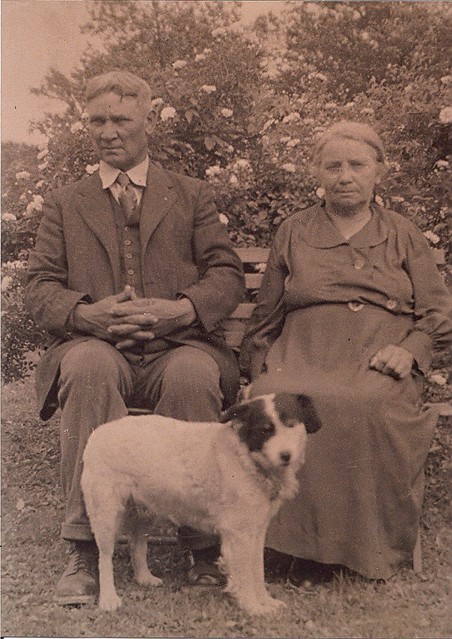 In September 1908, at 30 years old, in rural Kentucky, my great-grandmother had her first child, a son, Walter. He was born on the 8th and died on the 12th. I don't know why he died.
In September 1908, at 30 years old, in rural Kentucky, my great-grandmother had her first child, a son, Walter. He was born on the 8th and died on the 12th. I don't know why he died.In early August 1909, my great-grandmother had her second child, also a son. She named him Otto, after a friend of the family. A year later, in late October, she strapped little Otto to her back so she could work in the fields. And sometime later, she took little Otto off her back, and he was dead.
I don't know if she and my great-grandfather were still sharecroppers then when Otto died or if by then they had their own farm, but I know that she had to work, just as millions of women before her and after her have had to work. She had no choice but to strap that baby to her back and go into the fields. The horror of that moment is not something I think I could have survived. She did survive it. She had nine more children, eight of whom survived infancy, including my paternal grandmother. She had her last child at 44.
I knew my great-grandmother - I was 10 when she died. To me, she was a quiet, sober woman who I never saw smile or laugh. I'm not sure she ever said a word to me. I admit to being afraid of her, sitting in silence, speaking only to fuss at my beloved great-grandfather who was constantly joking and making fun for his great-grandchildren. She was very frail by the time I knew her, and my grandmother, her daughter, directed me to brush her hair once. I stood behind her wheelchair, brushing that long, long gray hair, terrified I'd hurt her. It was only after she was gone that I learned of the story of Otto and the other two children - Walter and Edgar - that died so young. Her father died when she was just 6 years old, and as I understand it, she had to leave home quite young to work for some other family. She then moved to Henderson, Kentucky, more than 60 miles away, to work for another family. She married so late in life - what hardships did she experience before then, being a single woman in her teens and 20s working as a servant? She lost three babies, she had to feed her family when the Depression hit, and she struggled with a paralysis that left her wheelchair-bound for more than half her life - she lived to 98. No wonder she never smiled.
I don't fantasize about the past in the USA, or anywhere else, as some kind of idyllic, magical time. I think about all the children that died like my infant great Uncle. Or from filthy water. Or from malnutrition. I think about girls and women who never even had time to dream because they were too busy trying to survive. Poverty isn't some simpler lifestyle where life was easier: poverty is death in infancy, death in childbirth, death in the fields, death in a mine. It's lack of choices, lack of even time for imagining anything better. As I drove through rural Afghanistan in 2007, where people worked in fields and with animals under a very, very hot sun, a fellow aid worker remarked how beautiful the lifestyle was, how it was a shame to bring them aid and development if it meant they would have to give up their beautiful, simple life. I almost threw him out of the SUV.
I think about my great-grandparents and the various women I've tried to help as a humanitarian worker at least once a day, usually when I'm running the kitchen faucet to cook, or when I'm camping and I'm walking with a container to a communal faucet or pump. I make no apologies for wanting every person in the world to have that access, and nor any apologies for not mourning the "simple" life we'll lose if that happens. Good riddance.
No comments:
Post a Comment